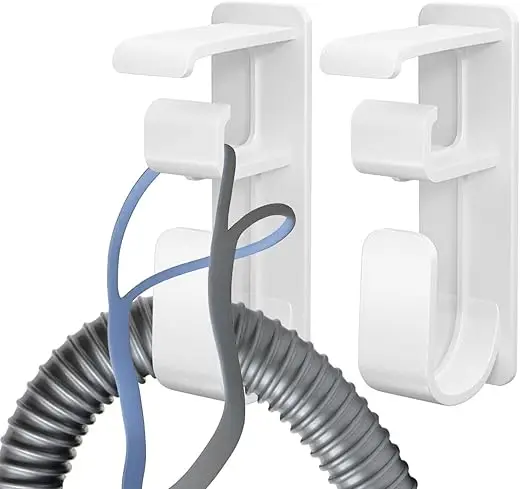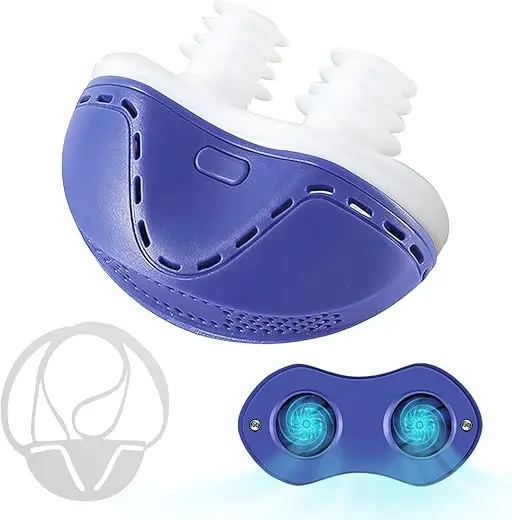The Shocking Truth About Sleep Apnea and Your Brain
Sleep apnea causes measurable brain damage that begins within months of onset and becomes increasingly severe over time. Studies show that people with untreated sleep apnea lose brain gray matter at twice the normal rate, develop white matter lesions similar to mini-strokes, and show cognitive decline equivalent to 10 years of aging. The damage affects memory centers, executive function regions, and emotional regulation areas.
Every night with untreated sleep apnea is like subjecting your brain to repeated drowning episodes. Your brain cells, desperate for oxygen, begin dying off. Neural connections break down. Toxic proteins accumulate. The very structure of your brain changes. This comprehensive guide reveals the symptoms of brain damage from sleep apnea, explains the mechanisms of destruction, and most importantly, shows you how to stop and potentially reverse the damage.
How Sleep Apnea Physically Damages Your Brain
The Nightly Brain Assault: What’s Really Happening
The Oxygen Deprivation Cycle:
- Airway closes during sleep (10-60+ seconds)
- Oxygen levels plummet (sometimes below 60%)
- Carbon dioxide builds up toxically
- Brain cells enter crisis mode
- Emergency awakening triggered
- Brief recovery, then cycle repeats
Cumulative Impact:
- 30 events/hour = 240 brain attacks nightly
- Each event kills neurons
- Inflammation cascades through brain
- Blood-brain barrier weakens
- Toxic proteins accumulate
The Three Mechanisms of Brain Destruction
1. Hypoxic Injury (Low Oxygen)
- Brain cells need constant oxygen
- After 4 minutes without oxygen, permanent damage
- Repeated mini-suffocations throughout night
- Hippocampus (memory) especially vulnerable
- Frontal cortex (thinking) severely affected
2. Oxidative Stress
- Free radicals released during oxygen fluctuations
- Like rust forming in your brain
- Damages cell membranes
- Destroys DNA
- Accelerates aging
3. Inflammation Cascade
- Inflammatory markers increase 300%
- Chronic brain inflammation
- Disrupts neural connections
- Triggers autoimmune responses
- Accelerates neurodegeneration
Early Brain Damage Symptoms (Months to 2 Years)
Cognitive Fog: The First Warning
Mental Clarity Loss:
- Thoughts feel “fuzzy” or unclear
- Can’t think of right words
- Lose track mid-conversation
- Reading comprehension declines
- Mental fatigue by noon
Processing Speed Reduction:
- Everything takes longer
- Simple tasks become difficult
- Reaction time slowed
- Driving becomes challenging
- Work productivity drops
Memory Problems Begin
Short-Term Memory Failure:
- Walk into rooms, forget why
- Can’t remember what you just read
- Forget conversations from yesterday
- Misplace items constantly
- Need lists for everything
Learning Difficulties:
- Can’t retain new information
- Training at work becomes hard
- Names impossible to remember
- Instructions need repeating
- Skills take longer to acquire
Attention and Focus Disruption
Concentration Collapse:
- Can’t focus more than minutes
- Easily distracted
- Mind wanders constantly
- Can’t complete tasks
- Multitasking impossible
Executive Function Decline:
- Planning becomes difficult
- Organization skills diminish
- Decision-making impaired
- Problem-solving slower
- Initiative decreased
Moderate Brain Damage Symptoms (2-5 Years)
Significant Memory Impairment
Episodic Memory Loss:
- Forget important events
- Can’t recall recent vacations
- Forget appointments regularly
- Repeat stories unknowingly
- Past becomes fuzzy
Working Memory Dysfunction:
- Can’t hold numbers in head
- Forget mid-task what you’re doing
- Cooking becomes dangerous
- Can’t follow TV plots
- Phone conversations difficult
Language and Communication Problems
Word-Finding Difficulties:
- “Tip of tongue” constantly
- Use wrong words (paraphasias)
- Sentences trail off
- Vocabulary shrinks
- Writing deteriorates
Comprehension Issues:
- Miss parts of conversations
- Instructions confusing
- Reading requires re-reading
- Misunderstand others frequently
- Jokes don’t make sense
Emotional Regulation Breakdown
Mood Instability:
- Sudden anger outbursts
- Crying without clear reason
- Irritability constant
- Anxiety attacks
- Depression deepens
Personality Changes:
- Become different person
- Loss of empathy
- Social withdrawal
- Apathy increases
- Motivation vanishes
Severe Brain Damage Symptoms (5-10+ Years)
Dementia-Like Presentation
Major Cognitive Impairment:
- Can’t manage finances
- Forget how to use appliances
- Get lost in familiar places
- Time confusion
- Don’t recognize people
Daily Function Impact:
- Need help with medications
- Driving becomes dangerous
- Work impossible
- Independence lost
- Require supervision
Structural Brain Changes Visible
MRI Findings:
- 15-20% gray matter loss
- White matter lesions throughout
- Hippocampal atrophy severe
- Ventricular enlargement
- Cortical thinning
Functional Changes:
- Neural networks disrupted
- Brain connectivity reduced
- Metabolism decreased
- Blood flow impaired
- Electrical activity abnormal
Neurological Symptoms
Motor Problems:
- Balance difficulties
- Coordination impaired
- Fine motor skills lost
- Tremors develop
- Walking changes
Sensory Changes:
- Vision problems
- Hearing processing issues
- Taste/smell alterations
- Touch sensitivity changes
- Spatial perception impaired
Brain Regions Specifically Damaged
Hippocampus: Your Memory Center
Damage Progression:
- 10% volume loss after 5 years
- 20% loss after 10 years
- New memory formation impossible
- Old memories fade
- Spatial navigation lost
Symptoms from Hippocampal Damage:
- Can’t form new memories
- Forget recent events
- Get lost easily
- Can’t learn new skills
- Time confusion
Frontal Cortex: Your CEO
Executive Function Destruction:
- Planning inability
- Judgment impaired
- Impulse control lost
- Abstract thinking gone
- Initiative absent
Behavioral Changes:
- Inappropriate behavior
- Poor decision-making
- Risk-taking increases
- Social skills deteriorate
- Empathy decreases
Temporal Lobes: Language and Emotion
Communication Breakdown:
- Language comprehension impaired
- Speech production affected
- Reading ability declines
- Writing deteriorates
- Emotional recognition lost
White Matter: Your Brain’s Internet
Connectivity Destruction:
- Information transfer slowed
- Coordination between regions lost
- Processing delays
- Integration failures
- Global dysfunction
Age-Specific Brain Damage Patterns
Young Adults (20-40): Subtle but Significant
Early Career Impact:
- Missed promotions
- Job performance issues
- Learning struggles
- Relationship problems
- Academic difficulties
Reversibility Potential:
- High recovery potential
- Quick response to treatment
- Near-complete restoration possible
- Neuroplasticity strong
- Prevention critical
Middle Age (40-60): Acceleration Phase
Peak Vulnerability:
- Damage accelerates rapidly
- Career-ending cognitive issues
- Family relationships strained
- Depression/anxiety severe
- Early retirement common
Intervention Critical:
- Partial reversibility possible
- Further damage preventable
- Function improvement likely
- Quality of life restoration
- Dementia prevention opportunity
Older Adults (60+): Compounded Damage
Dementia Overlap:
- Alzheimer’s risk 85% higher
- Vascular dementia common
- Faster cognitive decline
- Nursing home placement earlier
- Mortality increased
Limited Recovery:
- Damage often permanent
- Focus on preservation
- Slowing progression
- Maintaining function
- Quality of life priority
The Sleep Stages and Brain Damage
REM Sleep Deprivation
Why REM Matters:
- Memory consolidation occurs
- Emotional processing happens
- Creativity enhanced
- Learning solidified
- Brain detoxification
REM Loss Consequences:
- Memory formation impaired
- Emotional instability
- Problem-solving deficits
- Learning disabilities
- Toxic protein buildup
Deep Sleep (N3) Destruction
Deep Sleep Functions:
- Brain waste clearance
- Memory transfer
- Cellular repair
- Growth hormone release
- Immune function
N3 Loss Results:
- Alzheimer’s proteins accumulate
- Memory problems severe
- Physical recovery impaired
- Aging accelerated
- Disease risk increased
Distinguishing Sleep Apnea Brain Damage from Other Conditions
vs. Normal Aging
Sleep Apnea Damage:
- Rapid progression
- Affects younger people
- Specific pattern on MRI
- Reversible with treatment
- Associated with snoring/apnea
Normal Aging:
- Gradual changes
- After age 65 typically
- Different brain regions
- Not reversible
- No sleep symptoms
vs. Alzheimer’s Disease
Sleep Apnea:
- Can occur at any age
- Improves with CPAP
- Fatigue prominent
- Snoring history
- Oxygen drops documented
Alzheimer’s:
- Usually after 65
- Progressive despite treatment
- Memory loss primary
- No sleep apnea necessarily
- Genetic factors
vs. Depression
Sleep Apnea Cognitive Issues:
- Worse in morning
- Improves slightly during day
- Partner notices snoring
- Physical fatigue prominent
- CPAP helps dramatically
Depression Cognitive Issues:
- Consistent throughout day
- Motivation primary issue
- No snoring necessarily
- Emotional symptoms primary
- Antidepressants help
Testing for Brain Damage
Cognitive Assessments
Screening Tests:
- Montreal Cognitive Assessment (MoCA)
- Mini-Mental State Exam (MMSE)
- Clock drawing test
- Verbal fluency tests
- Memory index scores
Comprehensive Testing:
- Neuropsychological battery
- IQ testing comparison
- Memory specific tests
- Executive function assessment
- Processing speed measurement
Brain Imaging
MRI Findings:
- Gray matter volume loss
- White matter hyperintensities
- Hippocampal atrophy
- Cortical thinning
- Ventricular enlargement
Functional Imaging:
- PET scan shows metabolism
- fMRI shows activation patterns
- SPECT shows blood flow
- EEG shows electrical activity
- DTI shows connectivity
Blood Biomarkers
Emerging Tests:
- Neurofilament light chain
- Beta-amyloid levels
- Tau protein ratios
- Inflammatory markers
- S100B protein
Treatment: Stopping and Reversing Brain Damage
Immediate Interventions
CPAP Therapy:
- Stops ongoing damage immediately
- Allows brain repair to begin
- Improves oxygen delivery
- Reduces inflammation
- Enhances deep sleep
Expected Timeline:
- Week 1: Fog begins lifting
- Month 1: Memory improves
- Month 3: Concentration returns
- Month 6: Executive function better
- Year 1: Significant recovery
Brain Recovery Strategies
Cognitive Rehabilitation:
- Memory training exercises
- Problem-solving practice
- Attention training
- Processing speed work
- Executive function tasks
Neuroprotective Interventions:
- Omega-3 fatty acids
- Mediterranean diet
- Regular exercise
- Cognitive stimulation
- Social engagement
Measuring Recovery
Tracking Improvement:
- Cognitive testing every 6 months
- Work performance metrics
- Quality of life scores
- Family observations
- Brain imaging follow-up
Recovery Milestones:
- 3 months: Noticeable improvement
- 6 months: Significant gains
- 1 year: Major recovery
- 2 years: Maximal improvement
- Ongoing: Maintenance
Prevention: Protecting Your Brain
Early Detection
Warning Signs:
- Partner reports snoring
- Daytime fatigue
- Morning headaches
- Concentration problems
- Mood changes
Screening Priority:
- Family history of sleep apnea
- Overweight/obesity
- High blood pressure
- Age over 50
- Cognitive complaints
Lifestyle Brain Protection
Sleep Optimization:
- Consistent sleep schedule
- 7-9 hours nightly
- Side sleeping position
- Avoid alcohol/sedatives
- Weight management
Cognitive Reserve Building:
- Lifelong learning
- Social connections
- Physical exercise
- Mental challenges
- Stress management
The Reversal Potential: Hope Through Treatment
What Can Be Recovered
Highly Reversible:
- Attention and focus
- Processing speed
- Working memory
- Mood regulation
- Energy levels
Partially Reversible:
- Executive function
- Long-term memory
- Language skills
- Motor coordination
- Learning ability
Potentially Permanent:
- Severe hippocampal atrophy
- Extensive white matter disease
- Advanced dementia changes
- Severe cortical loss
- Long-standing damage (10+ years)
Success Stories
The Engineer, 45: “Couldn’t solve problems anymore. After 6 months of CPAP, I’m inventing again. Brain fog completely gone.”
The Teacher, 52: “Forgot student names, lesson plans. One year post-treatment, sharp as ever. Got my career back.”
The CEO, 58: “Was considering stepping down due to cognitive issues. CPAP saved my company and my mind.”
Taking Action: Your Brain Recovery Plan
Immediate Steps (This Week)
- Document cognitive symptoms
- Get partner observations
- Schedule sleep study
- Start sleep diary
- Avoid alcohol/sedatives
Short-term (Month 1-3)
- Begin CPAP/treatment
- Cognitive baseline testing
- Brain-healthy diet
- Exercise program
- Sleep optimization
Long-term (3-12 Months)
- Track cognitive improvement
- Cognitive rehabilitation
- Follow-up testing
- Lifestyle maintenance
- Prevent recurrence
The Bottom Line: Your Brain’s Future
Brain damage from sleep apnea is real, progressive, and devastating. But here’s the crucial message: it’s also preventable and often reversible. Every night you delay treatment, more neurons die, more connections break, and recovery becomes harder.
The brain damage symptoms you’re experiencing – the fog, forgetfulness, confusion, and cognitive decline – aren’t permanent sentences. They’re your brain’s cry for oxygen. Answer that call with treatment, and your brain can begin healing tonight.
Don’t accept cognitive decline as normal aging. Don’t dismiss memory problems as stress. Don’t let sleep apnea steal your mind. Treatment works, recovery is possible, and your cognitive future can be bright again.
Your brain has supported you your entire life. Now it needs your help. Give it the oxygen it desperately needs, and watch as your mental clarity, memory, and cognitive abilities return.
If you’re experiencing cognitive symptoms and suspect sleep apnea, don’t wait. Every night matters. Schedule a sleep study immediately and begin your journey back to mental clarity.



